cisco 352-001 Exam Questions
Questions for the 352-001 were updated on : Apr 19 ,2025
Page 1 out of 14. Viewing questions 1-15 out of 199
Question 1 Topic 1
Topic 1
You are designing a network solution to connect a primary data center to a disaster recovery site. The applications hosted on
the site will be mainly web and email servers that are provided through a virtualized environment. A third data center facility
may also be added in the next six months. Which connectivity type is appropriate for this design?
- A. L2TPv3
- B. VPLS
- C. point-to-point GRE tunnels
- D. VPWS
Answer:
B
Question 2 Topic 1
Topic 1
A service provider has a Resilient Ethernet Protocol ring running as a metro backbone between its locations in one city. A
customer wants to connect one site with one box redundant to the Resilient Ethernet Protocol ring at two different service
provider locations. How can this be done without producing any Layer 2 loops within the network design?
- A. Spanning tree at the service provider side only must be enabled.
- B. Spanning tree at the customer side onlymust be enabled.
- C. Flex Links at the service provider side only must be enabled.
- D. Flex Links at the customer side only must be enabled.
- E. EtherChannel at the service provider side and the customer side must be enabled.
- F. Spanning tree at the service provider side and the customer side must be enabled.
- G. Flex Links at the service provider side and the customer side must be enabled.
Answer:
D
Question 3 Topic 1
Topic 1
When creating a network design, which one of these options provides for basic Layer 2 client isolation to prevent broadcast
traffic exposure?
- A. SVI
- B. VLAN
- C. routed port
- D. edge port
Answer:
B
Question 4 Topic 1
Topic 1
Which option is a critical mechanism to optimize convergence speed when using MPLS FRR?
- A. IGP timers
- B. bandwidth reservation
- C. shared risk link groups
- D. down detection
Answer:
D
Question 5 Topic 1
Topic 1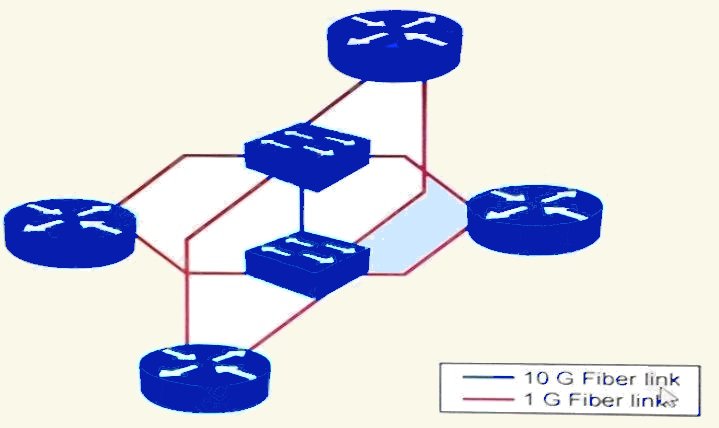
Refer to the exhibit. The two Ethernet switches are in close proximity to each other. Assuming that the IGP timers have
already been tuned for fast convergence, which additional change provides for the fastest network convergence time?
- A. Remove one of the Ethernet switches and connect all routers to only one Ethernet switch.
- B. Change all links between switches and routers to 10 GB/s.
- C. Use point-to-point links between the routers instead of connecting through the Ethernet switches.
- D. Change all links from fiber to copper.
Answer:
A
Question 6 Topic 1
Topic 1
You have created a network design that has two point-to-point Metro Ethernet circuits extending a single production VLAN
between two data centers. Under normal circumstances, one circuit will carry traffic and spanning tree will block the other. If
the company wants you to make use of both circuits to carry production traffic, which two technologies and features will you
investigate to integrate into your network design? (Choose two.)
- A. EtherChannel
- B. MST
- C. Multichassis EtherChannel
- D. PVST+
Answer:
A C
Question 7 Topic 1
Topic 1
Refer to the exhibit.
A service provider would like to use Ethernet OAM to detect end-to-end connectivity failures between SP-SW1 and SP-SW2.
In which two of these ways can you design this solution?
(Choose two.)
- A. Enable Y.1731 Connectivity Fault Management on the SP switches.
- B. E-LMI PDUs must be forwarded over VPLS.
- C. Cisco Discovery Protocol PDUs must be forwarded over the VPLS.
- D. Use upward maintenance endpoints on the SP switches.
- E. Enable IEEE 802.1ag Connectivity Fault Management on the SP switches.
Answer:
D E
Question 8 Topic 1
Topic 1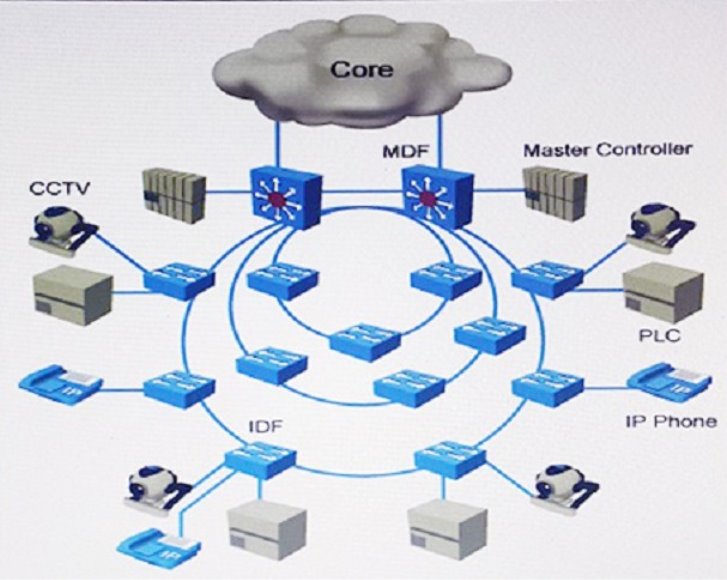
Refer to the exhibit. This smart city has decided to deploy a converged network for video surveillance and applications for
utility services. These new applications are delay-sensitive and require strict convergence times of less than 50 milliseconds.
The network is expected to have up to 50 intermediate distribution frames per ring. Which protocol provides less than 50
milliseconds convergence?
- A. G8032
- B. STP
- C. G 8031
- D. RSTP
Answer:
A
Question 9 Topic 1
Topic 1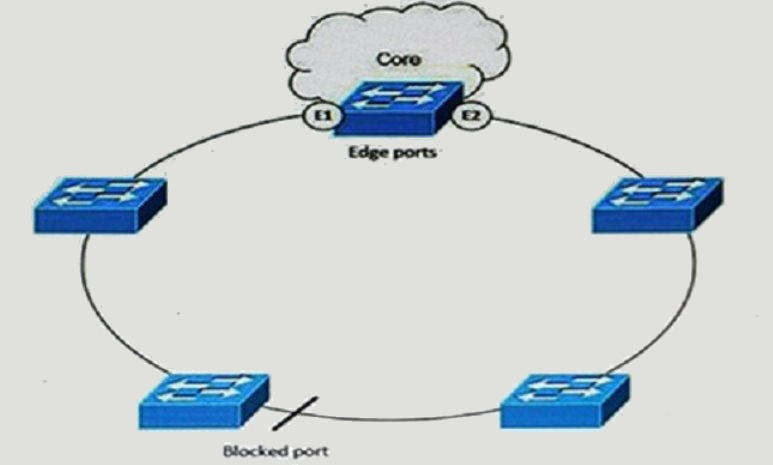
Refer to the exhibit. As the new network designer for a manufacturing company, you are designing this resilient Ethernet ring
for the plant Ethernet network that is connected to the core, which does not use STP. Both edge ports are on the same
switch in a ring segment. There is connectivity between the edge ports throughout the segment, so you create a redundant
connection between any two switches in the ring. Which four options are characteristics of this design? (Choose four.)
- A. If a link fails, then the alternate ports quickly unblock. When the failed ink comes back up, a physically blocked port per VLAN is selected with minimal disruption to the network.
- B. If a link fails, then the alternate portsquickly unblock. Whenthe failed ink comes back up, a logically blocked port per VLAN is selected with minimal disruption to the network.
- C. If VLAN load balancing is configured, then two ports in the segment control the blocked state of VLANs.
- D. If VLAN load balancing is configured, then one port in the segment controls the blocked state of VLANs.
- E. If all ports in the segment are operational, then one port is in the blocked state for each VLAN.
- F. If one or more ports in a segment are not operational, thereby causing a linkfailure, then all ports forward traffic on all VLANs to ensure connectivity.
- G. If all ports in the segment are operational, then two ports are in the blocked state for each VLAN.
Answer:
B C E F
Explanation:
REP segments have thefollowing characteristics:
If all ports in a segment are operational, one port (referred to as the alternate port) is in the blocked state for each VLAN. If
VLAN load balancing is configured, two ports in the segment control the blocked state of VLANs.
If one or more ports in a segment is not operational, and cause a link failure, all ports forward traffic on all VLANs to
ensure connectivity.
In case of a link failure, alternate ports are unblocked as quickly as possible. When the failed link is up, a logically blocked
portper VLAN is selected with minimal disruption to the network.
References:
Question 10 Topic 1
Topic 1
DRAG DROP
Drag the spanning-tree technology on the left to its description on the right.
Select and Place: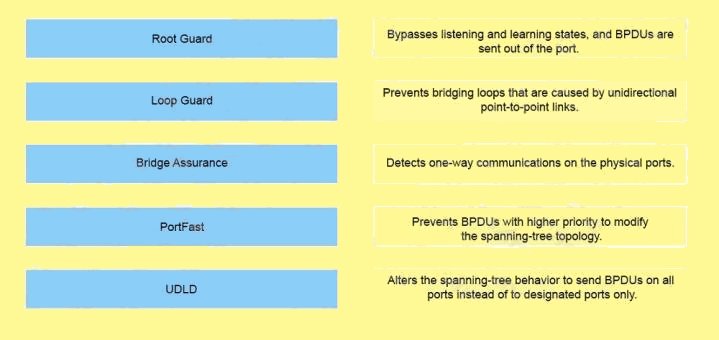
Answer:
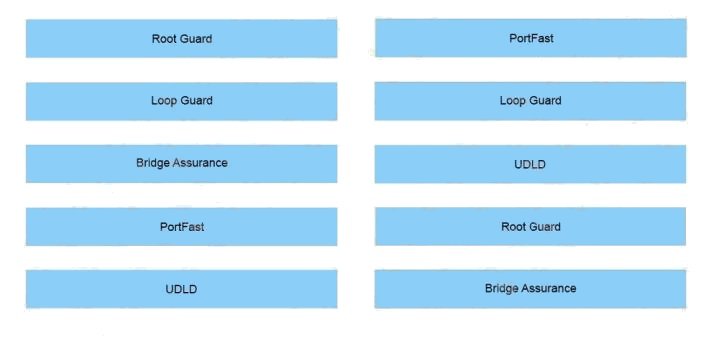
Question 11 Topic 1
Topic 1
What are two design advantages to using virtual port channel? (Choose two.)
- A. enhanced system availability through multiple systems
- B. reduced Spanning Tree Protocol convergence time
- C. loop management without use of Spanning Tree Protocol
- D. ability to use Spanning Tree Protocol blockedports to forward traffic
- E. enhanced abilityto recover from Spanning Tree Protocol changes
Answer:
A C
Question 12 Topic 1
Topic 1
In a network design using carrier Ethernet, which three mechanisms can be used to improve Layer 2 down detection and
thereby reduce routing convergence time? (Choose three.)
- A. BFD
- B. Ethernet port debounce timers
- C. link-state tracking
- D. object tracking
- E. fast IGP hello
Answer:
A D E
Question 13 Topic 1
Topic 1
Which option describes a design benefit of root guard?
- A. It prevents switch loops caused by unidirectional point-to-point link condition of Rapid PVST+ and MST.
- B. It allows small, unmanaged switches to be plugged into ports of access switches without the risk of switch loops.
- C. It does not generate a spanning-tree topology change upon connecting and disconnecting a station on a port.
- D. It prevents switched traffic from traversing suboptimal paths on the network
- E. It prevents switch loops by detecting one-way communications onthe physical port
- F. It makes the port go immediately into the forwarding state after being connected.
Answer:
B
Question 14 Topic 1
Topic 1
What is a correct design consideration of IPv6 MLD snooping?
- A. MLD snooping conserves CPU bysharing IPv4 and IPv6 multicast topology.
- B. MLD snooping conserves bandwidth on switches.
- C. MLD snooping is usedto filter all MLD queries.
- D. MLD snooping requires IGMP snooping to be implemented.
Answer:
B
Question 15 Topic 1
Topic 1
A mobile network operator is designing an NGN backhaul and plans to migrate their legacy SDH and SONET-based
transport network. The NGN network must achieve similar failover and failback times as the legacy network (50
milliseconds). Which method does allow for similar failover and failback times on the new packet-based network?
- A. BPDU
- B. E-OAM
- C. BFD
- D. UDLD
Answer:
C
Explanation:
References: